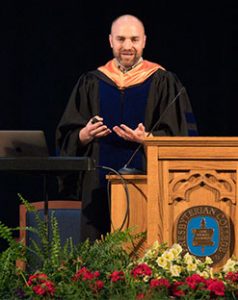Students, Professor Go on Quest for Truth on Honors Day
 During his Honors Day Convocation address, “The Quest for Truth,” physics professor Dr. Chad Rodekohr shared one of the biggest scientific discoveries: the first-ever image of a black hole.
During his Honors Day Convocation address, “The Quest for Truth,” physics professor Dr. Chad Rodekohr shared one of the biggest scientific discoveries: the first-ever image of a black hole.
“This image is not a normal picture,” Rodekohr said about the image, which captivated the science community and public only a few weeks earlier. He then went on to explain how 200 scientists around the world collaborated to put the image together.
Rodekohr explained how aperture and diameter, Maxwell’s Equation and other scientific factors contributed to create the first-ever image of a black hole.
“The point of all this,” Rodekohr explained, “is that, in order to accomplish this feat, the researchers had to understand and manipulate a host of abstract, complicated physical laws that describe this situation.”
Rodekohr said that scientists made several assumptions along the way.
“And they made these assumptions for a very simple reason,” Rodekohr said. “These are attributes of God, and they assume because these are attributes of God, that things that God has made turn back and proclaim His glory.”
Research in the Liberal Arts
More than 50 students presented research that is part of their own quest for truth and as relevant as the discovery of the black hole. The students offered up their research findings in Neville Hall classrooms and Kuhne Auditorium throughout the day.
Students majoring in science fields, like Emily Mitchell and Andrew King, presented on topics like “Kinetics of Tin Whisker Growth” and the “Genetic Influence of Methionine: A Study with Yeast Mutants,” respectively.
They shared the floor with students in humanities fields, like Samantha Fink and Robert Baker, who covered topics that ranged from “The American Failure: Armenian Genocide” to “School Choice and Its Impact on the Resegregation of American Public Schools.”
Meaningful Research
Haley Pye, a senior from Walterboro, S.C., talked about the inspiration for her research on female composers.
“I was discussing my research with an elderly woman over the summer who had been involved in music her entire life. She asked me what I was researching,” Pye said.
Pye told her she was researching female composers.
“Instead of asking me, ‘Who are you talking about?’ or ‘What period?’ or anything to that effect, she asked me, ‘Were there any?’” Pye said.
“That gave me the drive to make sure I did well on this.”
Pye chose composers whose names she read in the footnotes of history textbooks. She decided she wanted to learn more about them.
“I saw full-page spreads on major composers at the time,” Pye said. “And I thought, ‘Where are the full-page spreads on these others?’”
During her presentation, Pye spoke about the female composers’ lives, works and challenges. Pye played selections from each of the artists, including Francesca Caccini, who composed the first opera ever composed by a woman.
She also discussed Fanny Mendelssohn Hensel (the older sister of German composer Felix Mendelssohn), Barbara Strozzi, Elizabeth-Claude Jacquet de la Guerre, Marianna Martines and Amy Beach.
“The more people who research these women, the more people who write about these women, the more their work is performed, recorded, presented, and the more they can have the legacy they deserve, just as much as any composer,” Pye said.
Students Perform, Present Artwork
Pye was also one of nine student musicians to perform during Honors Day. She sang soprano during a recital that began in Edmunds Hall at 2:30 p.m. Other student musicians included:
- Bobby Azevedo, clarinet
- Harris Banks, cello
- Sharalynn Hicks, piano
- Collin McKinnon, cello
- Paul Peart II, violin
- Andrew Sheffield, piano
- Javernique Tinsley, violin
- Amy Wortkoetter, organ
An exhibit featuring the artwork of senior art major Lauren Adkins remained on display at the Elizabeth Stone Harper Gallery.
A Time to Thank and Reflect
Dr. Don Raber II, Provost, asked students to take a moment during the day to thank the professors who helped guide them during their research. He also asked them to reflect on their time at PC.
“I want you to think about when you arrived at PC, whether as a P1 at the School of Pharmacy or as an incoming freshman,” Raber said. “I want you to think about the way you were back then and where you are today.
“I hope when you do that, you’ll realize you’ve come a very long way during your time here on campus. And, as a result, you’ve gotten something out of the education that PC provides.”
